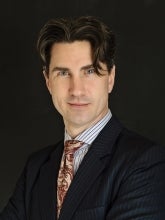Democratic erosion, climate change, asymmetric threats, housing insecurity—why are these and so many other problems so difficult to solve? And what can we do about it? Robert Lamb presents the results of a two-year study on the the state of the art in methods for researching and navigating complex social dynamics, with applications to policy research, wargaming, AI, modeling & simulation, and decision making around a wide range of global challenges. In this talk, he introduces a framework for building strategies around complex problems and proposes “Socioinformatics” as a new field for expanding knowledge around social complexity.
About the Speaker
Robert D. Lamb, Ph.D., is an Associate Research Scientist at the University of Maryland (UMD) where he leads the simulations, social complexity and democratic recovery portfolio at START, UMD’s counter-extremism research center. He is director of UMD’s ICONS Project, which creates role-play simulations and scenario-driven exercises, leads research on emerging technology and decision making in complex environments and maintains the ICONSnet simulation platform for education, training and human-in-the-loop research. In previous positions, Lamb was co-founder and CEO of the Foundation for Inclusion (which used complexity analytics and participatory methods to advise movements and funders on system change strategy), visiting research professor at the Army War College Strategic Studies Institute (SSI), conflict director at the Center for Strategic and International Studies (CSIS), and strategist at the Office of the Secretary of Defense (OSD/Strategy). His record includes more than 60 publications and about a hundred speaking engagements in more than 20 countries. Through his scholarly research and strategic advising, Lamb has produced four key conceptual innovations: illegitimacy as a robust theory of collapse in social and societal relations; dual-system theory as a framework for navigating policy complexity; collective strategy as a set of organizing principles and methods for system change; and socioinformatics as an interdisciplinary field of complex social dynamics. He has a cross-disciplinary Ph.D. covering policy, conflict, democracy, economics and ethics from the University of Maryland School of Public Policy and lives just outside of Washington, D.C., with his wife and two daughters.

